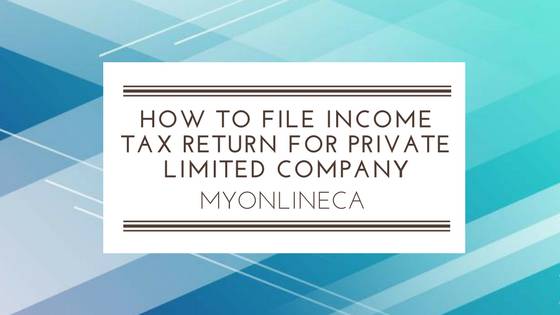In today’s guide we are talking about How to File Income Tax Return for Private Limited Company. All companies registered in India are required to file income tax returns each year on or before September 30th. Under the Income Tax Act, company tax return filing falls under two categories, namely domestic company or foreign company.
Companies like Private Limited Company, One Person Company or Limited Company are classified as a domestic company In India and are Required to go through the procedure for filing income tax return for a company.
Due Date for Company Tax Return Filing
All companies registered in India are required to file income tax return on or before the 30th of September.
Type of Tax Return to be Filed by Company
Form ITR
Companies registered and operating a business In India for profit must File Form ITR 6. Private limited companies, limited companies, and one person companies are required to file Form ITR6.
Documents Required for Company Tax Return Filing
ITR return forms are not capable of accepting document attachments. For that reason, there is no requirement for filing of any documents with the tax return like identity proof, bank statement, proof of investment, TDS certificates, etc. Still, all supporting documents for the income tax return must be stored by the taxpayer and should be produced before the tax authorities when demanded inquiry or assessment.Class 2 digital signature and PAN Card for Company is required for filing ITR 6 or ITR 7.
The process to File Income Tax Return for Private Limited Company
Maintaining Book of Accounts
It is important for all companies to maintain Book of Accounts not only to comply with the law but also to have control over the business operations. The Companies Act, 2013 makes it compulsory for all companies to maintain a book of accounts in the particularized format. Accounting software such as Tally or QuickBooks can help easily maintain a book of accounts for a business.
Recommend Read : Annual Compliance for Private Limited Company
Preparing Financial Statements of the Company
Financial statements mean any statement to provide information about the financial position, performance and changes in the financial position and it includes a balance sheet, profit and loss account and other statements etc.All companies are required to prepare financial statements of the company based on the Book of Accounts.
Appointing Auditor for the Company
Every Company must appoint the Auditor within one month of the registration of the company. Any person who is a qualified Chartered Accountant in practice, or a firm of Chartered Accountants can be appointed as the Auditors of the Company.
Auditing the Financial Statement of the Company
The Auditor after he/she is appointed by the Company will audit the financial statements of the Company and submit their report on the accounts of the Company to the members. The Auditor is also required to include in the report whether the accounts of the Company give a true and fair image of the state of affairs of the Company.
Conducting Annual General Meeting
At the Annual General Meeting, the audited financial statements of the Company with the Auditor’s Report and Directors Report are placed before the members of the Company. The members of the Company after checking and being satisfied with the financial statements, The financial statements of a company are considered final only after it is approved by the Shareholders of the company in the Meeting.
Private Limited Company Annual Return Filing
Once, the Annual General Meeting is completed and the audited financial statements are adopted by the Company, it must be filed with the Registrar. The filing of the audited financial statements of the company in the prescribed format to the Ministry of Corporate Affairs is called as the filing of annual return of a company. The annual return of the company must be filed within 60 days of the date on which the annual general meeting of the company was held.
Conclusion
To conclude this article I would like to shed some light on the following income tax rates that are applicable for companies registered in India, which are as follows:
For Domestic Companies :
- Domestic Companies are to be taxed at the rate of 30%.
- In Regards to Surcharge, If income is greater than Rs.1,00,00,000 – 7% of the income tax amount. If income is greater than Rs.10,00,00,000 – 12% of the income tax amount. Subject to marginal relief.
- In Regards to Education Cess, 2% extra – charged on the amount of income tax + surcharge being paid.
- In Regards to Secondary and Higher Education Cess,1% extra – charged on the amount of income tax + surcharge being paid.
For Foreign Companies :
- If the income received by the Foreign Company is in the form of fees for technical services and royalties paid by the Indian Government in relation to agreements made with an Indian concern will be taxed at 50%
- For Any Other Income, The Income Tax will be at 40%
- In Regards to Surcharge, If income is greater than Rs.1,00,00,000 – 2% of the income tax amount. If income is greater than Rs.10,00,00,000 – 5% of the income tax amount. Subject to marginal relief.
- In Regards to Education Cess, 2% extra – charged on the amount of income tax + surcharge being paid.
- In Regards to Secondary and Higher Education Cess,1% extra – charged on the amount of income tax + surcharge being paid.

